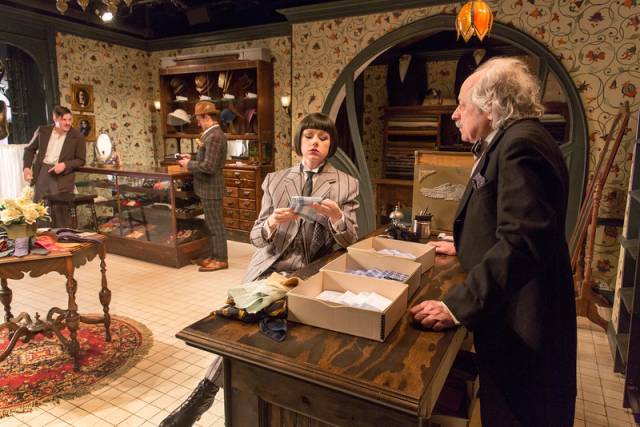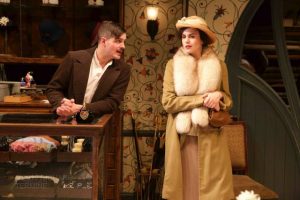

Many New York theaters strive to mine the creative brainpower of the city to keep churning out the newest, freshest, most cutting edge work they can find. Mint Theater Company, a modestly sized playhouse tucked mere steps away from the blinding Broadway marquees, has a different goal in mind. For the past two decades, artistic director Jonathan Bank and his team have worked to bring unknown and under-appreciated works to light, including their latest project, Ferenc Molnár's Fashions For Men.
Molnár's great grandson himself helped Bank translate and update the Hungarian author's original text, which is close to a century old. (Fashions premiered at Budapest's National Theater in 1917 and made its Broadway debut in 1922.) One of many plays penned by the extraordinarily prolific journalist, playwright, and novelist, Fashions for Men is, as Mint's dramaturgical advisor Maya Cantu so aptly pens in her bio of Molnár, a "cosmopolitan fairytale for adults." Our hero, though it may be a stretch to call him such, is Peter Juhász, owner of a high class haberdashery in Budapest. Trusting to a fault, and seemingly incapable of seeing the bad in people, he extends far too much credit and is at risk of losing his business, a possibility that becomes all the more immediate when his wife runs off with one of his employees and a good sum of his savings.
Endlessly optimistic, he seeks the aid of his patron, a wisecracking Count, to sort things out and win back his shop. Throw a loyal busybody of a clerk, a beautiful young assistant, and a handful of eccentric customers, and you have an over the top comedy of errors, one that, in the charming improbability of its situations, manages to avoid farce and yet still hint at darker, sadder elements lurking below the surface in a sly commentary on our distrust of unqualified kindness and the sinister motives that inspire our lusts and whims.

Standout performances include Joe Delafield as a perfectly perplexing blend of faultless and frustrating in the role of Juhász and Jeremy Lawrence as the scene-stealing, opera-loving shop clerk Philip, peeking behind corners and doing his best to look out for his boss. John Tufts is an ideal embodiment of the questionable but relatable morality of Molnár's roles, neurotic but undeniably gifted as salesman Oscar, who is less than apologetic about his intentions with the boss's wife. The rest of the cast of characters work dutifully to create the hustle and bustle of a big city shop or a small town office, colliding and mingling in this surprising and fun jaunt.
Fashions for Men sidesteps real drama by carefully overemphasizing the delivery of the play's almost, but not quite as incisive, Wildean witticisms with a punchy bravado, paired with carefully a choreographed physical element that borders on slapstick. Adding to the larger -- or at least stranger -- than life sense of the play's universe is the collapsing of time that is necessary to propel the rather sprawling plot along, but that requires nothing more than a slight suspension of disbelief to stomach, an easy task in the face of a swift, delightful performance.
The compact but lavishly realistic sets, designed by Daniel Zimmerman, and appropriately sartorial elegance of the costumes, designed by Martha Hally, are delightful to look at, and especially considering the intimacy of venue, one may be quite tempted to step straight into Juhász's store of candy colored fineries and try on a hat or two.